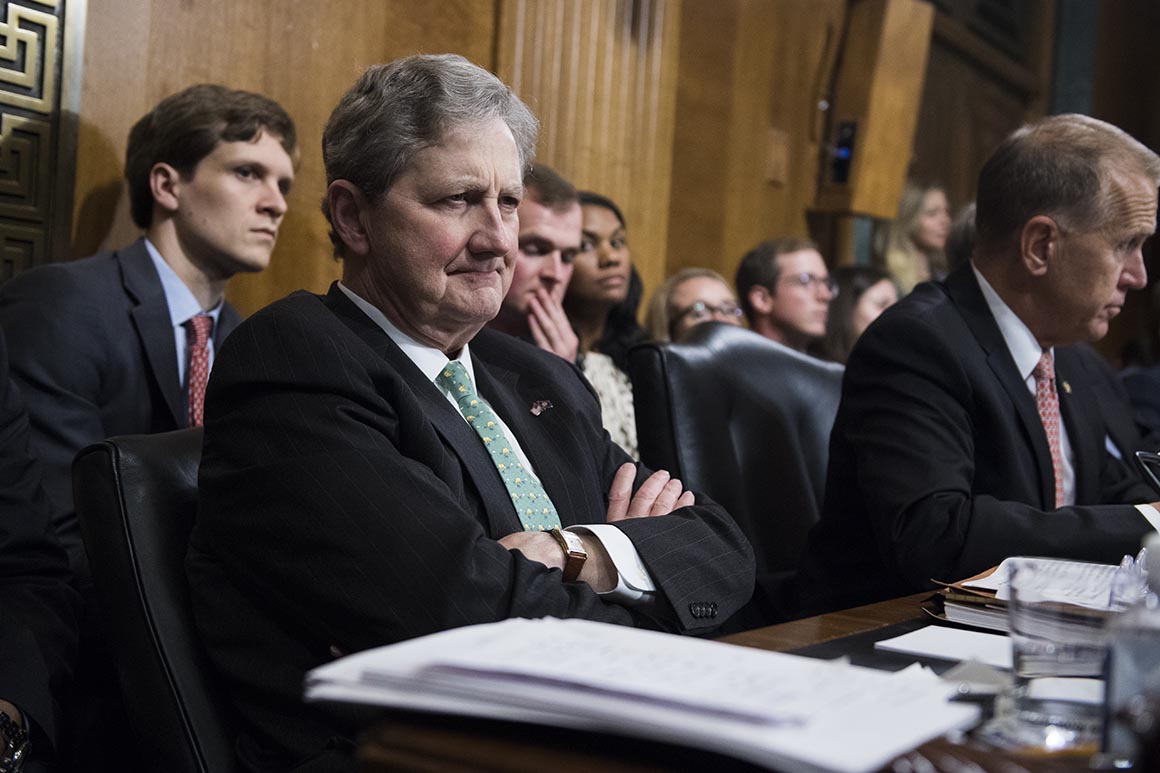
Sen. John Kennedy of Louisiana, known for his folksy style and colorful quotes, complained that the restrictions send the “wrong message.“
“It’s a huge mistake,” Kennedy said. “U.S. senators are grown women and grown men. If they don’t want to make a comment, they know how to say ‘no comment.’ … We aren’t children.”
“I don’t think you guys should ever be restricted,” said Sen. Mike Braun (R-Ind.). He added that while he has no issues talking to the press, the new rules are “kind of a way to give some certainty to the individuals that maybe don’t want to interact.”
The Senate sergeant-at-arms and U.S. Capitol Police are looking to drastically curtail press access to lawmakers for the duration of the trial, which could last more than two weeks. Among the potential restrictions, according to a letter sent to Senate leadership from the Standing Committee of Correspondents, are confining reporters to a press pen on the second floor of the Capitol and limiting their ability to walk with senators from the Senate subways.
“Finally, we’re being protected from the overbearing press,” deadpanned Senate Democratic Whip Dick Durbin (D-Ill.), who said he’d heard there would be a 15 minute delay from adjournment before questions could be asked.
Sen. Brian Schatz (D-Hawaii) called for the restrictions to be walked back.
“The new restrictions imposed on the press will make it more difficult for reporters to keep the public informed about every step of this historic trial,” he said in a statement. “These unreasonable restrictions must be reversed so that the press has the access they need to do their jobs, expose the truth, and keep our leaders accountable.”
The press restrictions come after the 2018 confirmation hearing of Kavanaugh, during which the chamber was flooded with protesters following allegations that he sexually assaulted Christine Blasey Ford when they were teenagers. Then-Sen. Jeff Flake (R-Ariz.) was famously confronted by two female protesters on the way to a key vote on Kavanaugh.
Senate Rules Chairman Roy Blunt (R-Mo.) acknowledged Tuesday that he’s more worried about protesters in the aftermath of the Kavanaugh hearings.
“I’m concerned about that,” Blunt said. “The ability of members to move to this important responsibility without having to fight their way onto an elevator or fight their way between people who come between them in the [Senate] buildings, that’s my concern.”
Sen. John Cornyn (R-Texas) also attributed the restrictions at least in part to the Kavanaugh confirmation, noting that senators were „harassed.“
“I’m for making it as available as we can; obviously we saw in the Kavanaugh hearings things got out of control,” Cornyn said. “I think that’s the goal. I don’t think the goal is to exclude the press. It’s to try to provide some decorum.”
When asked about the criticism of the restrictions, Blunt said Wednesday they would occur only twice a day — likely when senators are coming and going from the hearing. Aside from a certain window of time, he said, “if you’re credentialed press you’ll have the same kind of access in the building you always have, which is pretty mutually beneficial.”
Senate Rules Committee ranking member Amy Klobuchar (D-Minn.) lambasted the restrictions in an interview Tuesday with CBS News, calling them „a big mistake“ and blamed Senate Majority Leader Mitch McConnell for the decision.
„I wanted to actually open it more and allow laptops to be used in the press gallery,“ Klobuchar said. „In the end, Mitch McConnell is the majority leader.„
Senate Majority Whip John Thune (R-S.D.) said Wednesday the Rules Committee and Capitol Police should reach an agreement that balances safety and security with press access.
“Hopefully we’ll come up with a good balanced plan that achieves the objective of making sure this is done in an efficient, effective safe way but with ample opportunity for the media to do their jobs,” he said.
Reporters won’t be the only ones facing restrictions during the trial. Senators will also be asked to leave their phones and other electronic devices outside the chamber. According to Durbin, there will be a storage cabinet outside the chamber, with slots for each senator as well as chargers.
Sen. Lisa Murkowski (R-Alaska), who is viewed as a potential swing vote on impeachment, said she doesn’t mind the restrictions on electronics.
“Paying attention is significant and important and I’m glad that we can put these devices down,” Murkowski said. “It’s beautifully old-fashioned.”
John Bresnahan contributed to this report.
Source: politico.com
See more here: news365.stream






